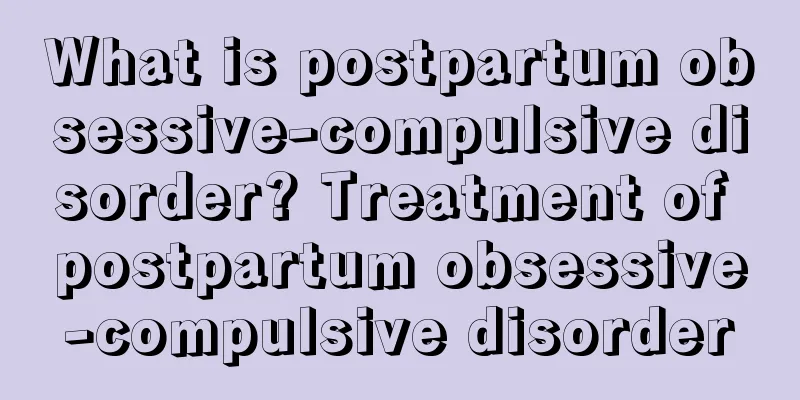What is postpartum obsessive-compulsive disorder? Treatment of postpartum obsessive-compulsive disorder

|
Everyone is familiar with obsessive-compulsive disorder. In real life, many people should have obsessive-compulsive disorder, but it manifests in different places. So what is postpartum obsessive-compulsive disorder? How should postpartum obsessive-compulsive disorder be treated? Let's introduce it together below! What is postpartum obsessive-compulsive disorder?Obsessive-compulsive disorder is a mental illness characterized by anxiety, depression, and compulsion. A US study shows that new mothers are five times more likely to suffer from obsessive-compulsive disorder than the average person, with a 10% chance of developing the disorder. This is mainly because women experience huge changes in hormones from pregnancy to childbirth, especially after the baby is born, when they are eager to give him all the good things without reservation and take care of him wholeheartedly, and their mood will also change with the baby. Symptoms of postpartum obsessive-compulsive disorderSymptoms of obsessive thinking are that some thoughts and ideas always recur, and you want to control them, but you can't. If it has a big impact on your life, it is recommended that you start to adjust yourself. You can try to adjust yourself first. When these worries appear in your mind, remind yourself that these are just thoughts, not facts. Don't follow the thoughts to identify with them. The anxiety caused by these thoughts will naturally pass as long as you wait calmly. Allow worry and anxiety to appear, understand yourself, and don't reject the feeling of worry. When anxiety comes, accept it and continue to do your own things. If you still can't adjust yourself, and the impact on your life is getting bigger and bigger, it is recommended that you still seek help from professional institutions in time. ? Treatment for postpartum obsessive compulsive disorder1. Relax and take it easyAfter giving birth, new mothers will be particularly concerned about their children. They cannot trust relatives and friends around them, and they are even more worried about leaving their children to nannies. They are always worried that their children will not get the best care. In this way, new mothers are always in a state of tension, seeking perfection in everything, and putting too much pressure on themselves. If you want to improve this situation, you must relax your body and mind, slowly adjust your life, communicate more with others, and trust others more. If you encounter a problem, don't carry it alone, talk to relatives and friends more, and seek more help. 2. Develop self-confidenceAfter giving birth, new mothers always pay special attention to their image in other people's eyes. They always want to ask other people's opinions about themselves no matter what they do. This will create a lot of invisible pressure on themselves. Try to believe in yourself. 3. Have your own hobbiesNew mothers should learn not to be affected by bad news. When seeing or hearing bad news, try not to pay attention to it. Having your own hobbies, listening to music or eating desserts are all good ways to adjust. 4. Give yourself some time and spaceAfter giving birth, new mothers will put all their time and energy into taking care of their children. In fact, in addition to taking care of their children, new mothers should learn to adjust themselves and allocate their time more reasonably. Going out shopping, having afternoon tea with friends, or watching a movie are all good choices. 5. Seek medical helpIf the new mother cannot control her behavior and thoughts well, she needs to seek help from a psychologist. Through communication with the doctor, the doctor will give a practical psychological treatment plan for the specific problem to solve the new mother's postpartum obsessive-compulsive disorder problem. The family members of the new mother should also pay more attention to them, discover problems in time, and treat them as soon as possible. Precautions1. Exposure and ritualistic behaviors block different aspects of OCD from treatment, so both steps must be performed. 2. The frequency of exposure should be sufficient, the duration of each exposure should be long enough, and it is best to have the participation of other people. 3. Cognitive adjustment throughout the process is the key to preventing relapse and maintaining long-term therapeutic effects. 4. Since this therapy will make people more anxious and painful in the short term, one must have a high enough motivation for treatment and determination to change, and be mentally prepared to "endure temporary pain and bring long-term liberation." 5. Friends who are addicted to alcohol or abuse substances, friends with serious illusions and delusions, and friends with severe depression are not suitable for the above treatments.
|
<<: Can babies eat yam? Can babies eat yam?
>>: How to do newborn hearing screening and what are the indicators
Recommend
What are the disadvantages of children going out at night? The real reason why they can't go out at night
We often hear people, especially the elderly, say...
How do women choose underwear to avoid vaginitis?
Many women are attracted by lace panties when the...
How to choose a breast pump? Basic knowledge of breastfeeding
Moms all know that breast milk is the best for ba...
Can pregnant women with constipation rub their stomachs? Pay attention to the technique
Constipation is a very painful thing for pregnant...
The correct way to prepare milk powder Common methods of preparing and consuming infant milk powder
Milk powder is the baby's food, just like the...
Are eczema and prickly heat the same? What is the difference between eczema and prickly heat?
Eczema and prickly heat look similar, so many peo...
What is the most suitable age for babies to attend talent classes?
As social competition becomes increasingly fierce...
How to deal with children's allergies? What is the most effective way to relieve itching in children with allergies?
It is normal for children to have allergies, beca...
Baby's leg shape changes diagram Baby's leg shape development process diagram
After children start learning to walk, many paren...
Does emotion affect pregnancy? Does bad emotion affect pregnancy?
Will bad mood affect pregnancy? Many people are v...
How long after giving birth can I lose weight? What should I pay attention to when losing weight after giving birth?
Everyone should know that you should be very care...
What to do if a newborn baby doesn't sleep well? Reasons why a newborn baby doesn't sleep
It is a headache to coax a baby to sleep after gi...
What can't babies under one year old eat? Common foods such as soy sauce are not allowed
Parents with babies at home know that after six m...
Will stretch marks appear on the neck? Why do stretch marks appear?
You should prevent stretch marks from growing dur...
How to eat eggs during pregnancy? Is it better to eat eggs or duck eggs during pregnancy?
Eggs are a food we eat frequently. They have high...









